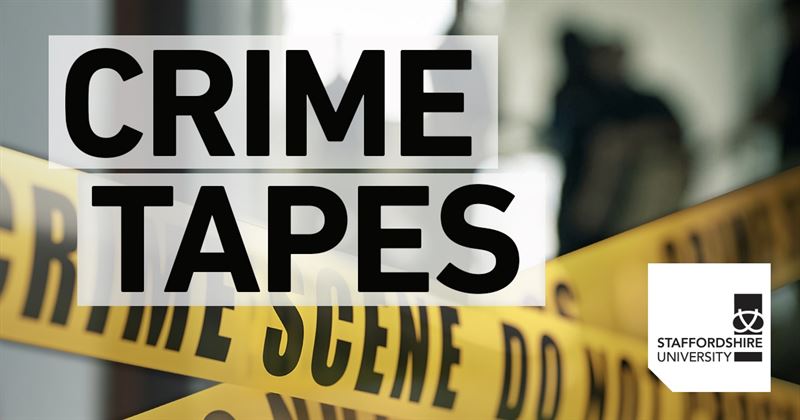Crime Tapes: helping domestic abuse victims take back control

Policing experts from Staffordshire University say the new Domestic Abuse Act will significantly help to protect victims from controlling partners
Crime Tapes…on Coercive Control is the latest episode of the popular podcast hosted by the School of Law, Policing and Forensics and puts the increasingly recognised crime under the spotlight with guest Deborah Sproston-Bewley.
Policing and Criminal Investigation Lecturer Deborah explained: “You’re probably familiar with most forms of domestic abuse such as domestic violence, which is physical or verbal abuse, but there’s a more subtle form of domestic abuse and that’s coercive and controlling behaviour.
“Some of the ways that the offender will do this is to isolate a victim from their support system. They will stop or limit them seeing family and friends, they’ll monitor phone calls and day-to-day activity of the victim and deny them freedom or autonomy. These are all subtle ways to gain control.”
Recent high-profile victims have helped to raise awareness of the crime including ITV Wales presenter Ruth Dodson, whose husband was sentenced for three years after harassing her for nearly a decade and former Spice Girl Mel B has also spoken out about the controlling behaviour of her ex-husband.
Deborah previously worked with Staffordshire Police, specialising in domestic abuse, and helped to train officers across the county. Now, she helps to prepare policing students at Staffordshire University to deal with incidents of domestic abuse.
“It’s really important that we teach students how to recognise the signs of domestic abuse, how to conduct interviews with victims and how to collect evidence. You need officers that have got the ability to think outside the box, to see what people don’t want them to see and to problem solve.
“Our teaching includes practical sessions where students wear body cams and enter a real-life scenario set up in the crime scene house on campus. This helps them develop the practical skills of how to interact with victims and how to behave.”
In April, the new Domestic Abuse Bill was signed into law and for the first time in history there will be a wide-ranging legal definition of domestic abuse which incorporates a range of abuses beyond physical violence, including emotional, coercive or controlling behaviour, and economic abuse.
Deborah said: “The bill will be significant and concentrates on the after-effects of domestic abuse. It will put so much more support in place for the victims to take control back, for example regaining control of their finances or helping them to resolve tenancy issues.
“It will also encourage more people to make use of existing legislation such as Claire’s Law. This was introduced after Claire Wood was murdered by a partner who had a history of serial abuse including stalking and kidnapping. The law provides the ‘right to know’ which means anyone who feels at risk of domestic violence can ask the police if their partner has a criminal history.”
In the podcast, Deborah discusses other landmark cases with Professor of Criminology James Treadwell. This includes Sally Challen who was convicted for murdering her abusive husband in 2011, which Deborah believes was the catalyst for the government to introduce the controlling or coercive behaviour (CCB) offence in 2015.
Despite the number of recorded offences and prosecutions increasing year on year since its introduction, a recent review of the CCB offence found there is still room for improvement in understanding, identifying and evidencing CCB and recommended increasing the maximum sentence to 10 years.
Deborah added: “For many years the police weren’t trained in how to deal with domestic abuse and more importantly how to recognise it. Things have improved considerably in recent years but I think there is still a way to go and this new legislation is a positive step forward.”
All episodes of the Crime Tapes podcast are available to stream on a range of platforms including Apple Podcasts and Spotify
Amy Platts
Media Communications Officer
t: 01782 292702
m: 07799 341911
e: amy.platts@staffs.ac.uk
Staffordshire University is the Connected University; connected to the needs of students, academic partners, business and society. Our main city campus in Stoke-on-Trent features excellent learning and teaching facilities and good transport links. We have specialist Centres of Excellence in Healthcare Education at Stafford and Shrewsbury.
We were recognised with a Gold award in the 2019 Teaching Excellence and Student Outcomes Framework (TEF) for delivering consistently outstanding teaching, learning and outcomes for students.
We were shortlisted for University of the Year at the THE Awards 2020 and were named ‘Midlands University of the Year’ at the Midlands Business Awards 2020.
Staffordshire University has signed up to the Civic University Agreement, pledging to play a leading role in improving the regional economy and enhancing quality of life in local communities. We were recognised in the top 15 for social inclusion in The Times and Sunday Times Good University Guide 2021. We aim to be a leading university for digital technologies building on our proud computing heritage and in 2019 launched Staffordshire University London’s Digital Institute which is committed to preparing students for careers in new and emerging tech industries.
We are a Top 250 Young University (Times Higher Education Young University Rankings 2020) and are connected globally, with more than 11,000 people studying Staffordshire University degrees overseas.


